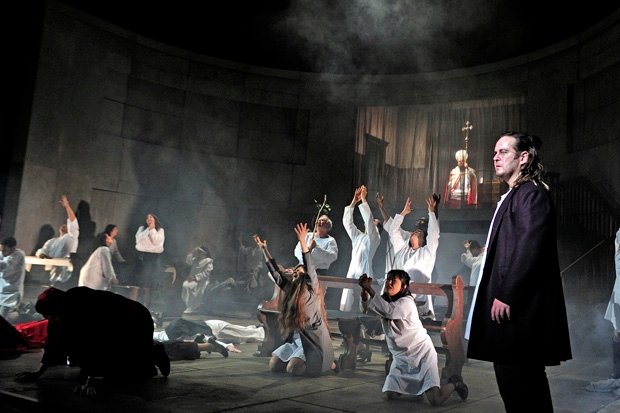Seventeen years ago the Norwegian National Opera staged two cycles of the Ring in Norwich’s Theatre Royal, performances that have remained vividly in the minds of anyone who saw them. Now Theater Freiburg has visited Norwich with two performances each of Parsifal and Tannhäuser. I was hoping to see both, but transport problems meant that I was only able to go to the second performance of Tannhäuser. I shall have quite a few criticisms to make, but all told it was a triumph, and was warmly received by a far from capacity audience.
There aren’t many chances to see this problem child of Wagner’s, and this was the finest account I have seen in several decades, much more moving than the Royal Opera’s production of nearly four years ago. Where Tim Albery’s production was merely null, this new one of Freiburg’s is a fairly aggressive example of director’s theatre, that disease which has nearly killed my inclination to go to operas, with Wagner being the chief victim. The would-be murderer in this case is Eva-Maria Höckmayr, who has so many bad ideas of a fashionable kind that one can confidently predict a big career for her.

As has become routine, the Overture is played — extremely well, by the Philharmonic Orchestra of Freiburg — with the curtain up, so we are quickly introduced to the perplexing muddle that constitutes Höckmayr’s contribution. The set is disorganised and ugly — some pews, a confessional with a staircase winding up it, and at the back, and on a higher level, behind a semi-transparent curtain, a Biedermeier sitting room. The Pope makes a brief appearance, a colossus who only appears here and to take a curtain call at the end. Men and women dressed mainly in neutral grey, the men with medieval haircuts, arrive and clobber one another, raise a woman (I think) on a cross, while a lost-looking figure gazes in understandable bewilderment; and two women, very similarly dressed in scarlet and white, and with black hair, easily mistaken for one another — Venus and Elisabeth, of course — do so many things that I have forgotten all of them. Plenty of blossoming staffs, which are never seen again.
In this version, broadly speaking Wagner’s Vienna version from 1875, the Overture runs straight into the overheated Venusberg music that Wagner composed for Paris. It is his most unpleasant and in some ways advanced music, pre-empting the prelude to Der Rosenkavalier and all the other late Romantic depictions of orgasm, incipient, premature or indefinitely delayed. The admirable conductor Fabrice Bollon turned on the volume and robbed it of any light and shade, making it seem merely noisy. Projections on the walls of nipples were all we were allowed of visual indulgence.
So how, why did I enjoy the performance so much? Because musically, thanks to the orchestra, the chorus, especially the superlative male chorus and most of the singers, Wagner’s drama struggled through and won, to the extent that this flawed but fascinating work can. The great performance came from the Elisabeth of Dana Burasová, who sang, from the moment she entered in Act II, with passionate abandon and precision. One could overlook the colour-coding of her dresses — red and white, as are Venus’s, constantly shed and put on again — and some of the egregious demands made on her, since her conception of the role was so heartfelt. Her plea for Tannhäuser against the bloodthirsty Christian crew was overpowering, as was the great ensemble that follows it.

If Astrid Weber’s Venus was less impressive, that was because Wagner gives her such fascinatingly feeble music to sing — the biggest puzzle: how come that the one dud figure in his whole output is one with whom one would expect him to empathise or even identify? The Shepherd Boy, only listed as ‘Soloist with the Boys Choir of Calw’, was easily the finest I have ever heard — firm, full and utterly un-English.
The other star was the Wolfram of Alejandro Lárraga Schleske, imposing both as actor and as singer, making every note of a diffuse role mean something, and grappling with Venus, torn almost as much as the anti-hero himself, to telling effect. Tannhäuser is the man without qualities, so Christian Voigt’s colourless account of the title role wasn’t inappropriate, though it was largely dull. He is one of those singers of the part who saves himself to give a powerful interpretation of the Rome Narration, and that worked well. So despite, or possibly because of the director, the central characters interacted tellingly and made as strong an impact as they can in this confused work. The rest of the production — including a mute, superfluous, ubiquitous ‘Old Tannhäuser’ — could be ignored.
This is my last column written with Liz Anderson as Arts Editor. Only people who have worked for her know how ideally she has fulfilled that role for 20 years. She only intrudes to suggest that her contributors have misspelt, or made a crass factual error, or — like me — might stop regarding full stops as their mortal foe. No doubt The Spectator will find a suitable replacement, but they couldn’t find a superior one.






Comments